Leadership Style in Nursing
VerifiedAdded on 2022/12/28
|10
|2551
|40
AI Summary
This article discusses the importance of leadership style in the nursing department and explores two contemporary leadership theories: authentic leadership and servant leadership. It highlights the benefits and implications of these leadership styles in the healthcare industry and emphasizes the need for a combination of both styles. The article also discusses the role of leadership in creating a positive and adaptive atmosphere in healthcare organizations.
Contribute Materials
Your contribution can guide someone’s learning journey. Share your
documents today.
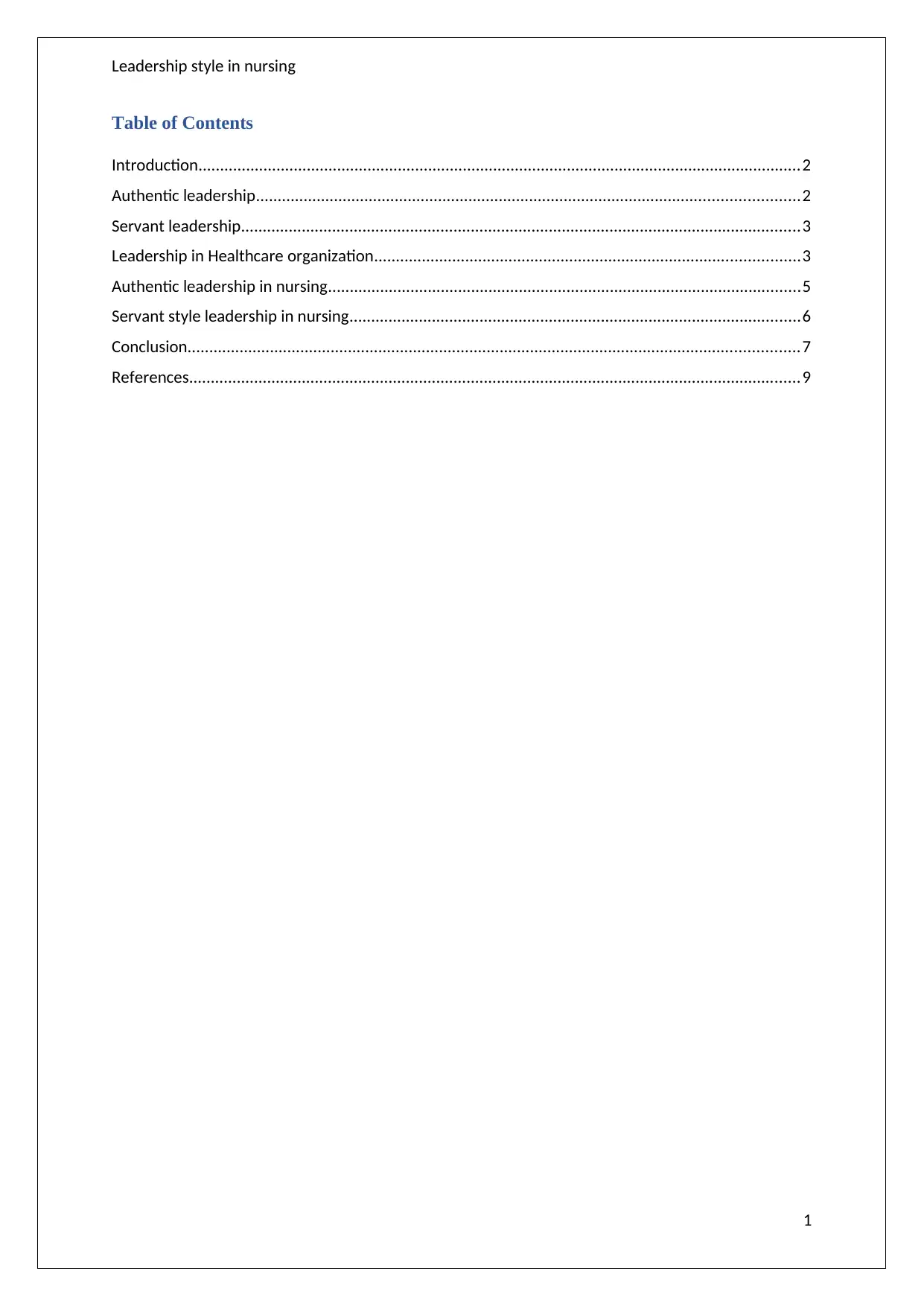
Leadership style in nursing
Table of Contents
Introduction...........................................................................................................................................2
Authentic leadership.............................................................................................................................2
Servant leadership.................................................................................................................................3
Leadership in Healthcare organization..................................................................................................3
Authentic leadership in nursing.............................................................................................................5
Servant style leadership in nursing........................................................................................................6
Conclusion.............................................................................................................................................7
References.............................................................................................................................................9
1
Table of Contents
Introduction...........................................................................................................................................2
Authentic leadership.............................................................................................................................2
Servant leadership.................................................................................................................................3
Leadership in Healthcare organization..................................................................................................3
Authentic leadership in nursing.............................................................................................................5
Servant style leadership in nursing........................................................................................................6
Conclusion.............................................................................................................................................7
References.............................................................................................................................................9
1
Secure Best Marks with AI Grader
Need help grading? Try our AI Grader for instant feedback on your assignments.
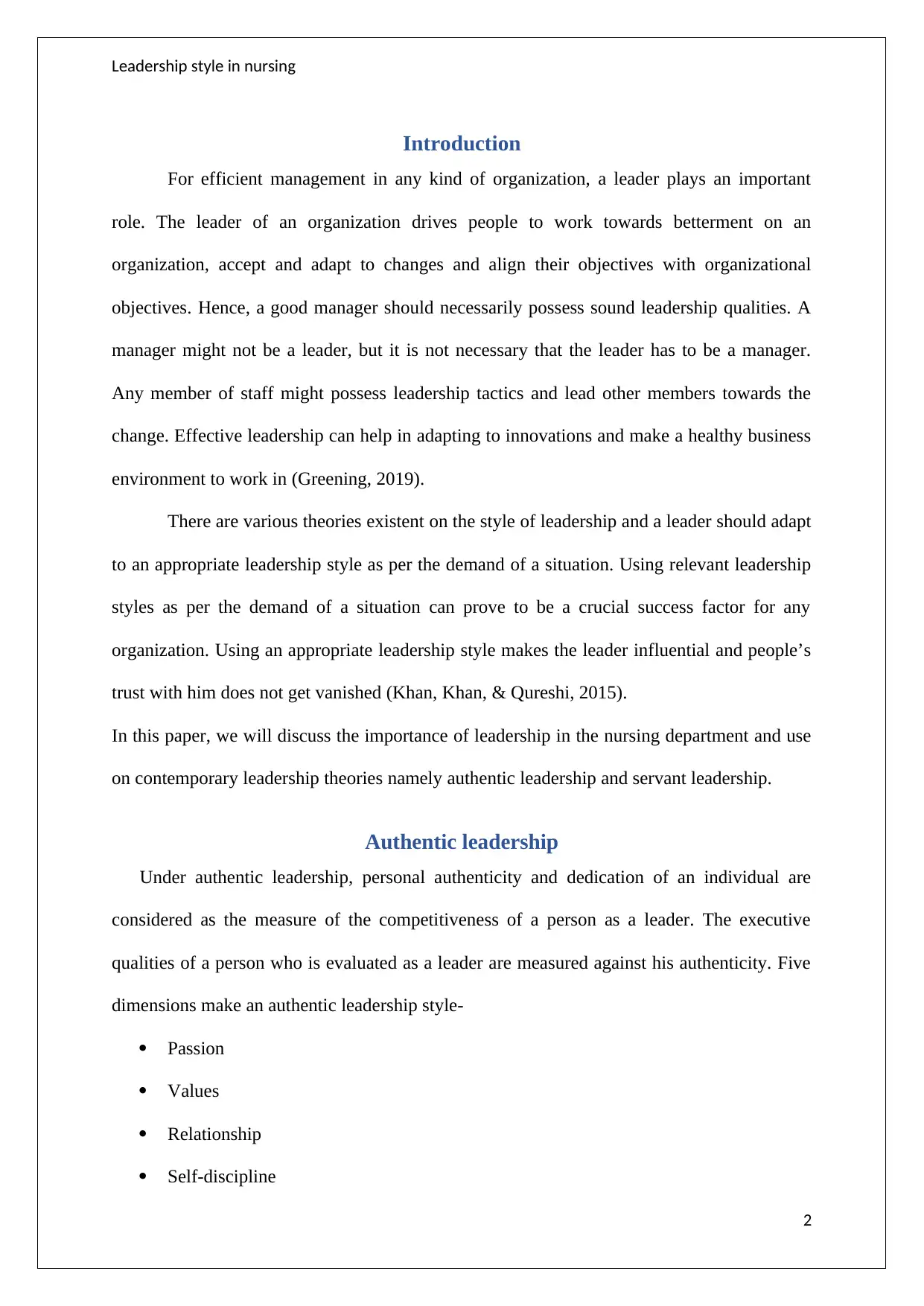
Leadership style in nursing
Introduction
For efficient management in any kind of organization, a leader plays an important
role. The leader of an organization drives people to work towards betterment on an
organization, accept and adapt to changes and align their objectives with organizational
objectives. Hence, a good manager should necessarily possess sound leadership qualities. A
manager might not be a leader, but it is not necessary that the leader has to be a manager.
Any member of staff might possess leadership tactics and lead other members towards the
change. Effective leadership can help in adapting to innovations and make a healthy business
environment to work in (Greening, 2019).
There are various theories existent on the style of leadership and a leader should adapt
to an appropriate leadership style as per the demand of a situation. Using relevant leadership
styles as per the demand of a situation can prove to be a crucial success factor for any
organization. Using an appropriate leadership style makes the leader influential and people’s
trust with him does not get vanished (Khan, Khan, & Qureshi, 2015).
In this paper, we will discuss the importance of leadership in the nursing department and use
on contemporary leadership theories namely authentic leadership and servant leadership.
Authentic leadership
Under authentic leadership, personal authenticity and dedication of an individual are
considered as the measure of the competitiveness of a person as a leader. The executive
qualities of a person who is evaluated as a leader are measured against his authenticity. Five
dimensions make an authentic leadership style-
Passion
Values
Relationship
Self-discipline
2
Introduction
For efficient management in any kind of organization, a leader plays an important
role. The leader of an organization drives people to work towards betterment on an
organization, accept and adapt to changes and align their objectives with organizational
objectives. Hence, a good manager should necessarily possess sound leadership qualities. A
manager might not be a leader, but it is not necessary that the leader has to be a manager.
Any member of staff might possess leadership tactics and lead other members towards the
change. Effective leadership can help in adapting to innovations and make a healthy business
environment to work in (Greening, 2019).
There are various theories existent on the style of leadership and a leader should adapt
to an appropriate leadership style as per the demand of a situation. Using relevant leadership
styles as per the demand of a situation can prove to be a crucial success factor for any
organization. Using an appropriate leadership style makes the leader influential and people’s
trust with him does not get vanished (Khan, Khan, & Qureshi, 2015).
In this paper, we will discuss the importance of leadership in the nursing department and use
on contemporary leadership theories namely authentic leadership and servant leadership.
Authentic leadership
Under authentic leadership, personal authenticity and dedication of an individual are
considered as the measure of the competitiveness of a person as a leader. The executive
qualities of a person who is evaluated as a leader are measured against his authenticity. Five
dimensions make an authentic leadership style-
Passion
Values
Relationship
Self-discipline
2
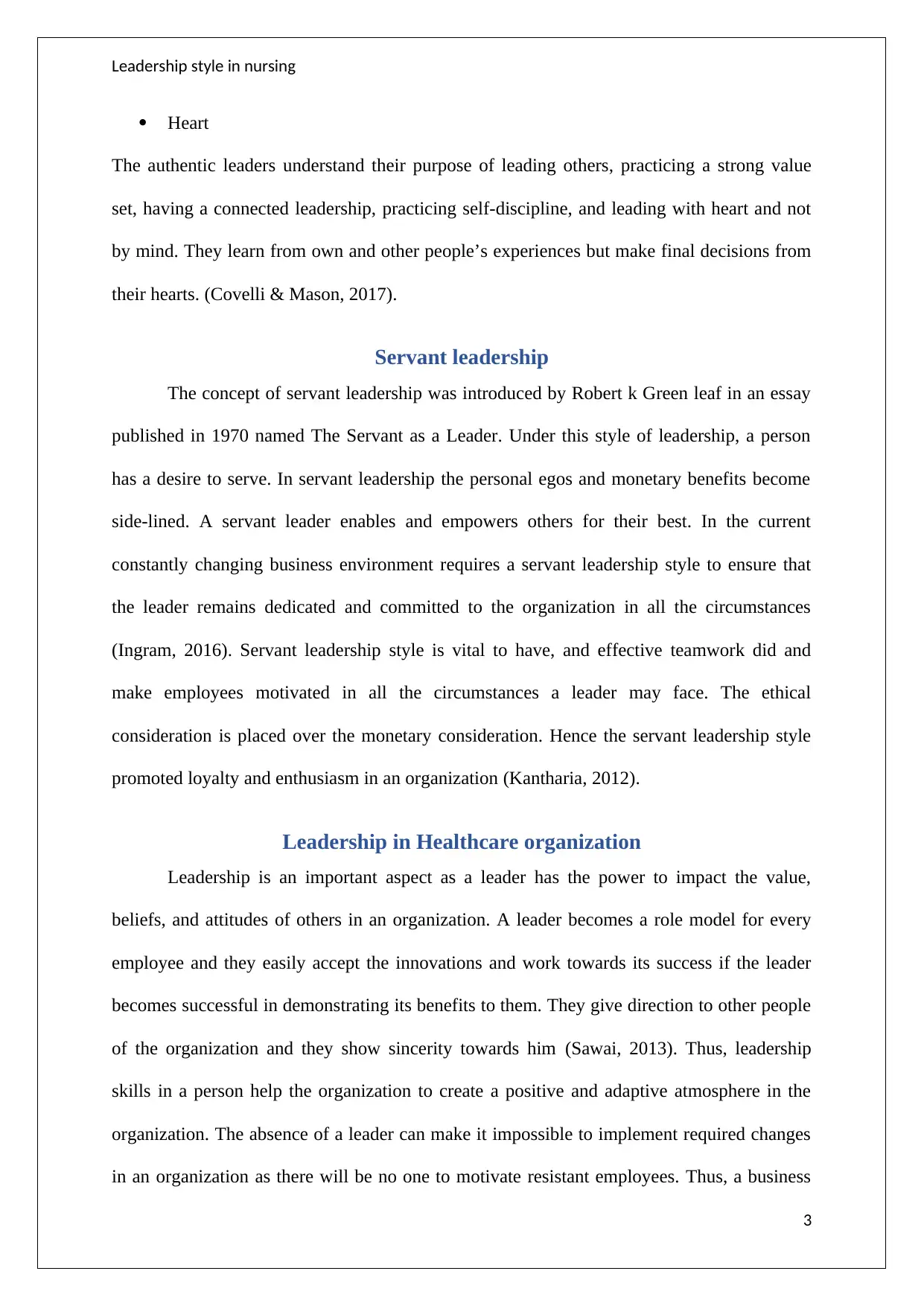
Leadership style in nursing
Heart
The authentic leaders understand their purpose of leading others, practicing a strong value
set, having a connected leadership, practicing self-discipline, and leading with heart and not
by mind. They learn from own and other people’s experiences but make final decisions from
their hearts. (Covelli & Mason, 2017).
Servant leadership
The concept of servant leadership was introduced by Robert k Green leaf in an essay
published in 1970 named The Servant as a Leader. Under this style of leadership, a person
has a desire to serve. In servant leadership the personal egos and monetary benefits become
side-lined. A servant leader enables and empowers others for their best. In the current
constantly changing business environment requires a servant leadership style to ensure that
the leader remains dedicated and committed to the organization in all the circumstances
(Ingram, 2016). Servant leadership style is vital to have, and effective teamwork did and
make employees motivated in all the circumstances a leader may face. The ethical
consideration is placed over the monetary consideration. Hence the servant leadership style
promoted loyalty and enthusiasm in an organization (Kantharia, 2012).
Leadership in Healthcare organization
Leadership is an important aspect as a leader has the power to impact the value,
beliefs, and attitudes of others in an organization. A leader becomes a role model for every
employee and they easily accept the innovations and work towards its success if the leader
becomes successful in demonstrating its benefits to them. They give direction to other people
of the organization and they show sincerity towards him (Sawai, 2013). Thus, leadership
skills in a person help the organization to create a positive and adaptive atmosphere in the
organization. The absence of a leader can make it impossible to implement required changes
in an organization as there will be no one to motivate resistant employees. Thus, a business
3
Heart
The authentic leaders understand their purpose of leading others, practicing a strong value
set, having a connected leadership, practicing self-discipline, and leading with heart and not
by mind. They learn from own and other people’s experiences but make final decisions from
their hearts. (Covelli & Mason, 2017).
Servant leadership
The concept of servant leadership was introduced by Robert k Green leaf in an essay
published in 1970 named The Servant as a Leader. Under this style of leadership, a person
has a desire to serve. In servant leadership the personal egos and monetary benefits become
side-lined. A servant leader enables and empowers others for their best. In the current
constantly changing business environment requires a servant leadership style to ensure that
the leader remains dedicated and committed to the organization in all the circumstances
(Ingram, 2016). Servant leadership style is vital to have, and effective teamwork did and
make employees motivated in all the circumstances a leader may face. The ethical
consideration is placed over the monetary consideration. Hence the servant leadership style
promoted loyalty and enthusiasm in an organization (Kantharia, 2012).
Leadership in Healthcare organization
Leadership is an important aspect as a leader has the power to impact the value,
beliefs, and attitudes of others in an organization. A leader becomes a role model for every
employee and they easily accept the innovations and work towards its success if the leader
becomes successful in demonstrating its benefits to them. They give direction to other people
of the organization and they show sincerity towards him (Sawai, 2013). Thus, leadership
skills in a person help the organization to create a positive and adaptive atmosphere in the
organization. The absence of a leader can make it impossible to implement required changes
in an organization as there will be no one to motivate resistant employees. Thus, a business
3
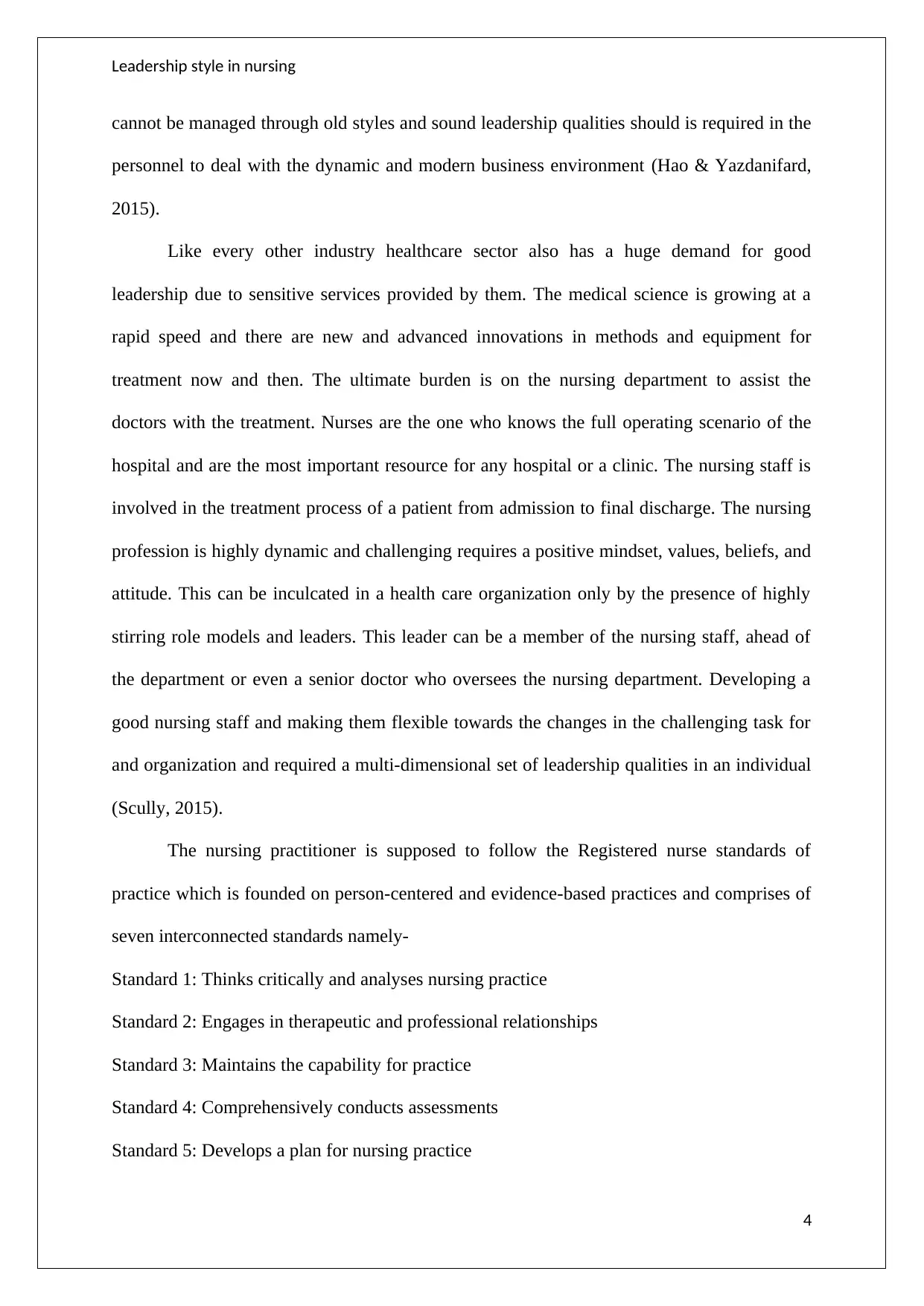
Leadership style in nursing
cannot be managed through old styles and sound leadership qualities should is required in the
personnel to deal with the dynamic and modern business environment (Hao & Yazdanifard,
2015).
Like every other industry healthcare sector also has a huge demand for good
leadership due to sensitive services provided by them. The medical science is growing at a
rapid speed and there are new and advanced innovations in methods and equipment for
treatment now and then. The ultimate burden is on the nursing department to assist the
doctors with the treatment. Nurses are the one who knows the full operating scenario of the
hospital and are the most important resource for any hospital or a clinic. The nursing staff is
involved in the treatment process of a patient from admission to final discharge. The nursing
profession is highly dynamic and challenging requires a positive mindset, values, beliefs, and
attitude. This can be inculcated in a health care organization only by the presence of highly
stirring role models and leaders. This leader can be a member of the nursing staff, ahead of
the department or even a senior doctor who oversees the nursing department. Developing a
good nursing staff and making them flexible towards the changes in the challenging task for
and organization and required a multi-dimensional set of leadership qualities in an individual
(Scully, 2015).
The nursing practitioner is supposed to follow the Registered nurse standards of
practice which is founded on person-centered and evidence-based practices and comprises of
seven interconnected standards namely-
Standard 1: Thinks critically and analyses nursing practice
Standard 2: Engages in therapeutic and professional relationships
Standard 3: Maintains the capability for practice
Standard 4: Comprehensively conducts assessments
Standard 5: Develops a plan for nursing practice
4
cannot be managed through old styles and sound leadership qualities should is required in the
personnel to deal with the dynamic and modern business environment (Hao & Yazdanifard,
2015).
Like every other industry healthcare sector also has a huge demand for good
leadership due to sensitive services provided by them. The medical science is growing at a
rapid speed and there are new and advanced innovations in methods and equipment for
treatment now and then. The ultimate burden is on the nursing department to assist the
doctors with the treatment. Nurses are the one who knows the full operating scenario of the
hospital and are the most important resource for any hospital or a clinic. The nursing staff is
involved in the treatment process of a patient from admission to final discharge. The nursing
profession is highly dynamic and challenging requires a positive mindset, values, beliefs, and
attitude. This can be inculcated in a health care organization only by the presence of highly
stirring role models and leaders. This leader can be a member of the nursing staff, ahead of
the department or even a senior doctor who oversees the nursing department. Developing a
good nursing staff and making them flexible towards the changes in the challenging task for
and organization and required a multi-dimensional set of leadership qualities in an individual
(Scully, 2015).
The nursing practitioner is supposed to follow the Registered nurse standards of
practice which is founded on person-centered and evidence-based practices and comprises of
seven interconnected standards namely-
Standard 1: Thinks critically and analyses nursing practice
Standard 2: Engages in therapeutic and professional relationships
Standard 3: Maintains the capability for practice
Standard 4: Comprehensively conducts assessments
Standard 5: Develops a plan for nursing practice
4
Secure Best Marks with AI Grader
Need help grading? Try our AI Grader for instant feedback on your assignments.
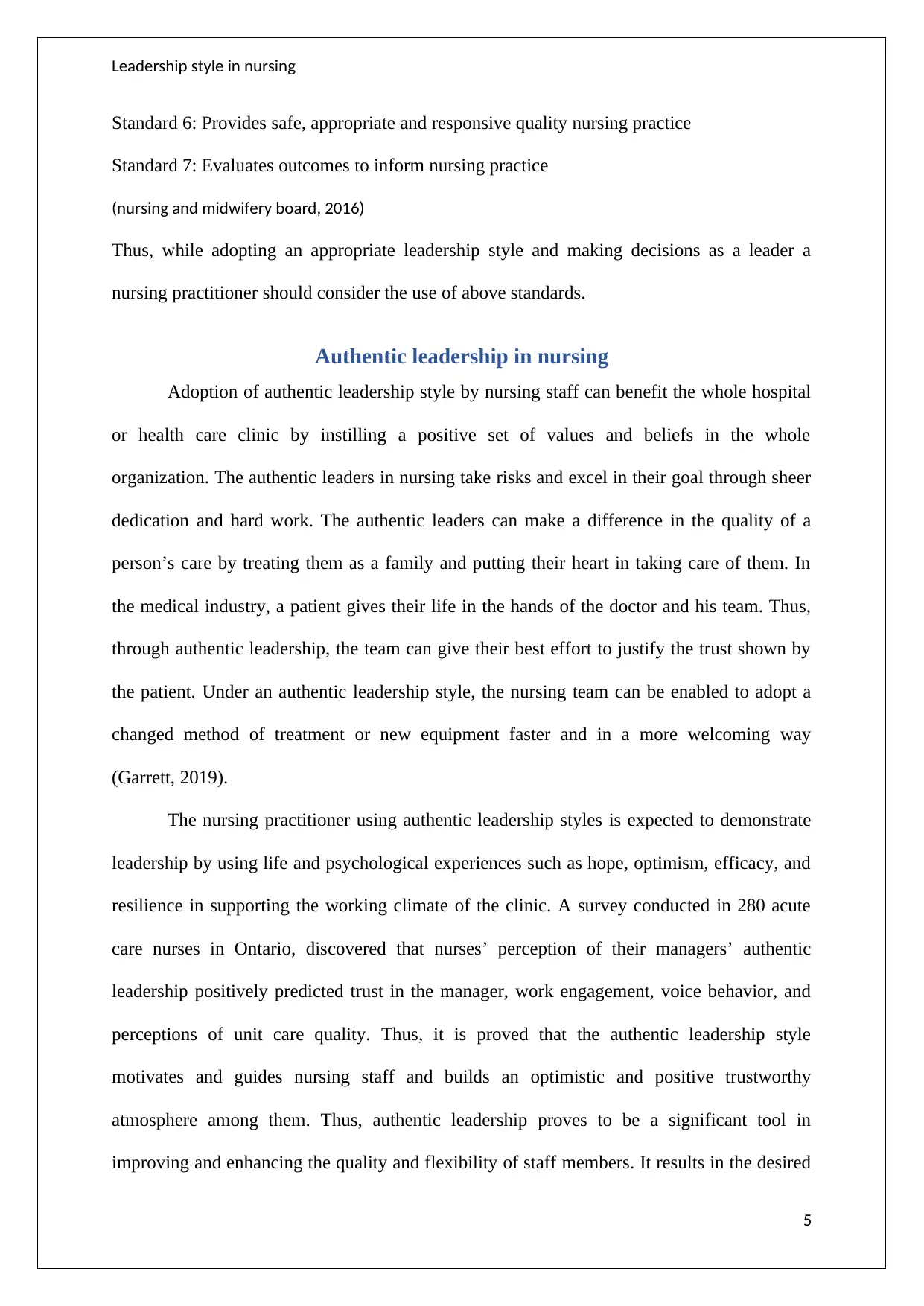
Leadership style in nursing
Standard 6: Provides safe, appropriate and responsive quality nursing practice
Standard 7: Evaluates outcomes to inform nursing practice
(nursing and midwifery board, 2016)
Thus, while adopting an appropriate leadership style and making decisions as a leader a
nursing practitioner should consider the use of above standards.
Authentic leadership in nursing
Adoption of authentic leadership style by nursing staff can benefit the whole hospital
or health care clinic by instilling a positive set of values and beliefs in the whole
organization. The authentic leaders in nursing take risks and excel in their goal through sheer
dedication and hard work. The authentic leaders can make a difference in the quality of a
person’s care by treating them as a family and putting their heart in taking care of them. In
the medical industry, a patient gives their life in the hands of the doctor and his team. Thus,
through authentic leadership, the team can give their best effort to justify the trust shown by
the patient. Under an authentic leadership style, the nursing team can be enabled to adopt a
changed method of treatment or new equipment faster and in a more welcoming way
(Garrett, 2019).
The nursing practitioner using authentic leadership styles is expected to demonstrate
leadership by using life and psychological experiences such as hope, optimism, efficacy, and
resilience in supporting the working climate of the clinic. A survey conducted in 280 acute
care nurses in Ontario, discovered that nurses’ perception of their managers’ authentic
leadership positively predicted trust in the manager, work engagement, voice behavior, and
perceptions of unit care quality. Thus, it is proved that the authentic leadership style
motivates and guides nursing staff and builds an optimistic and positive trustworthy
atmosphere among them. Thus, authentic leadership proves to be a significant tool in
improving and enhancing the quality and flexibility of staff members. It results in the desired
5
Standard 6: Provides safe, appropriate and responsive quality nursing practice
Standard 7: Evaluates outcomes to inform nursing practice
(nursing and midwifery board, 2016)
Thus, while adopting an appropriate leadership style and making decisions as a leader a
nursing practitioner should consider the use of above standards.
Authentic leadership in nursing
Adoption of authentic leadership style by nursing staff can benefit the whole hospital
or health care clinic by instilling a positive set of values and beliefs in the whole
organization. The authentic leaders in nursing take risks and excel in their goal through sheer
dedication and hard work. The authentic leaders can make a difference in the quality of a
person’s care by treating them as a family and putting their heart in taking care of them. In
the medical industry, a patient gives their life in the hands of the doctor and his team. Thus,
through authentic leadership, the team can give their best effort to justify the trust shown by
the patient. Under an authentic leadership style, the nursing team can be enabled to adopt a
changed method of treatment or new equipment faster and in a more welcoming way
(Garrett, 2019).
The nursing practitioner using authentic leadership styles is expected to demonstrate
leadership by using life and psychological experiences such as hope, optimism, efficacy, and
resilience in supporting the working climate of the clinic. A survey conducted in 280 acute
care nurses in Ontario, discovered that nurses’ perception of their managers’ authentic
leadership positively predicted trust in the manager, work engagement, voice behavior, and
perceptions of unit care quality. Thus, it is proved that the authentic leadership style
motivates and guides nursing staff and builds an optimistic and positive trustworthy
atmosphere among them. Thus, authentic leadership proves to be a significant tool in
improving and enhancing the quality and flexibility of staff members. It results in the desired
5
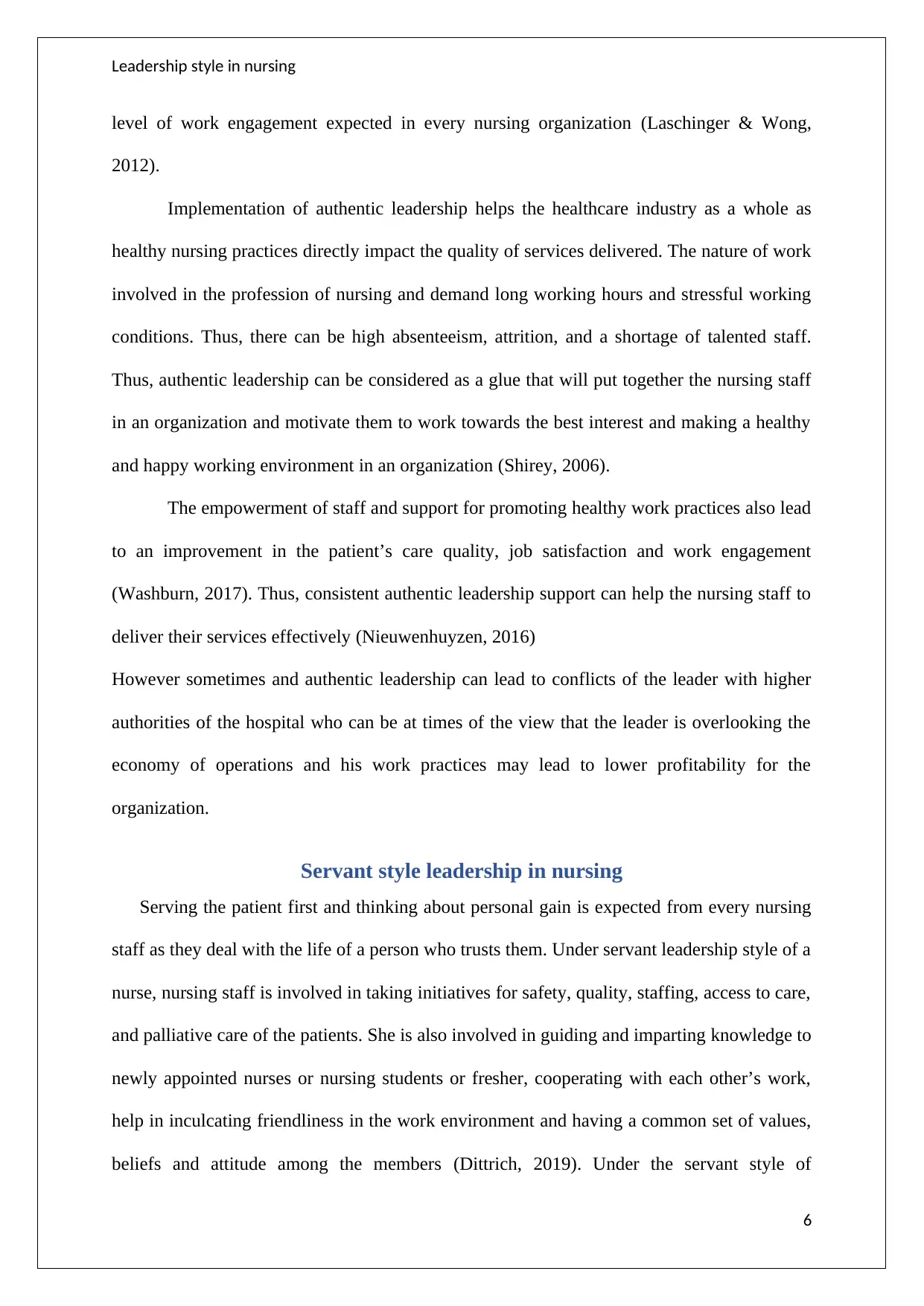
Leadership style in nursing
level of work engagement expected in every nursing organization (Laschinger & Wong,
2012).
Implementation of authentic leadership helps the healthcare industry as a whole as
healthy nursing practices directly impact the quality of services delivered. The nature of work
involved in the profession of nursing and demand long working hours and stressful working
conditions. Thus, there can be high absenteeism, attrition, and a shortage of talented staff.
Thus, authentic leadership can be considered as a glue that will put together the nursing staff
in an organization and motivate them to work towards the best interest and making a healthy
and happy working environment in an organization (Shirey, 2006).
The empowerment of staff and support for promoting healthy work practices also lead
to an improvement in the patient’s care quality, job satisfaction and work engagement
(Washburn, 2017). Thus, consistent authentic leadership support can help the nursing staff to
deliver their services effectively (Nieuwenhuyzen, 2016)
However sometimes and authentic leadership can lead to conflicts of the leader with higher
authorities of the hospital who can be at times of the view that the leader is overlooking the
economy of operations and his work practices may lead to lower profitability for the
organization.
Servant style leadership in nursing
Serving the patient first and thinking about personal gain is expected from every nursing
staff as they deal with the life of a person who trusts them. Under servant leadership style of a
nurse, nursing staff is involved in taking initiatives for safety, quality, staffing, access to care,
and palliative care of the patients. She is also involved in guiding and imparting knowledge to
newly appointed nurses or nursing students or fresher, cooperating with each other’s work,
help in inculcating friendliness in the work environment and having a common set of values,
beliefs and attitude among the members (Dittrich, 2019). Under the servant style of
6
level of work engagement expected in every nursing organization (Laschinger & Wong,
2012).
Implementation of authentic leadership helps the healthcare industry as a whole as
healthy nursing practices directly impact the quality of services delivered. The nature of work
involved in the profession of nursing and demand long working hours and stressful working
conditions. Thus, there can be high absenteeism, attrition, and a shortage of talented staff.
Thus, authentic leadership can be considered as a glue that will put together the nursing staff
in an organization and motivate them to work towards the best interest and making a healthy
and happy working environment in an organization (Shirey, 2006).
The empowerment of staff and support for promoting healthy work practices also lead
to an improvement in the patient’s care quality, job satisfaction and work engagement
(Washburn, 2017). Thus, consistent authentic leadership support can help the nursing staff to
deliver their services effectively (Nieuwenhuyzen, 2016)
However sometimes and authentic leadership can lead to conflicts of the leader with higher
authorities of the hospital who can be at times of the view that the leader is overlooking the
economy of operations and his work practices may lead to lower profitability for the
organization.
Servant style leadership in nursing
Serving the patient first and thinking about personal gain is expected from every nursing
staff as they deal with the life of a person who trusts them. Under servant leadership style of a
nurse, nursing staff is involved in taking initiatives for safety, quality, staffing, access to care,
and palliative care of the patients. She is also involved in guiding and imparting knowledge to
newly appointed nurses or nursing students or fresher, cooperating with each other’s work,
help in inculcating friendliness in the work environment and having a common set of values,
beliefs and attitude among the members (Dittrich, 2019). Under the servant style of
6
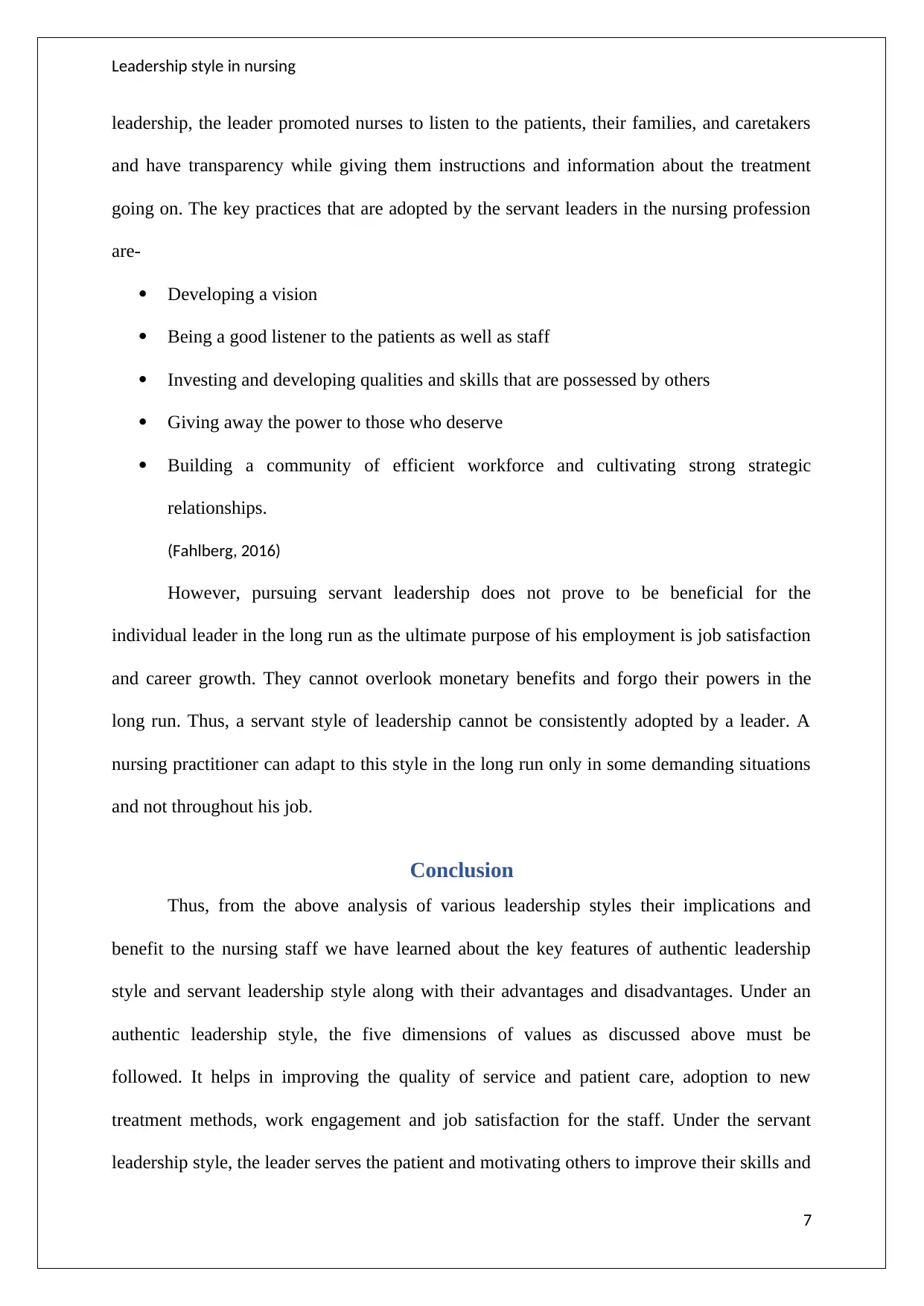
Leadership style in nursing
leadership, the leader promoted nurses to listen to the patients, their families, and caretakers
and have transparency while giving them instructions and information about the treatment
going on. The key practices that are adopted by the servant leaders in the nursing profession
are-
Developing a vision
Being a good listener to the patients as well as staff
Investing and developing qualities and skills that are possessed by others
Giving away the power to those who deserve
Building a community of efficient workforce and cultivating strong strategic
relationships.
(Fahlberg, 2016)
However, pursuing servant leadership does not prove to be beneficial for the
individual leader in the long run as the ultimate purpose of his employment is job satisfaction
and career growth. They cannot overlook monetary benefits and forgo their powers in the
long run. Thus, a servant style of leadership cannot be consistently adopted by a leader. A
nursing practitioner can adapt to this style in the long run only in some demanding situations
and not throughout his job.
Conclusion
Thus, from the above analysis of various leadership styles their implications and
benefit to the nursing staff we have learned about the key features of authentic leadership
style and servant leadership style along with their advantages and disadvantages. Under an
authentic leadership style, the five dimensions of values as discussed above must be
followed. It helps in improving the quality of service and patient care, adoption to new
treatment methods, work engagement and job satisfaction for the staff. Under the servant
leadership style, the leader serves the patient and motivating others to improve their skills and
7
leadership, the leader promoted nurses to listen to the patients, their families, and caretakers
and have transparency while giving them instructions and information about the treatment
going on. The key practices that are adopted by the servant leaders in the nursing profession
are-
Developing a vision
Being a good listener to the patients as well as staff
Investing and developing qualities and skills that are possessed by others
Giving away the power to those who deserve
Building a community of efficient workforce and cultivating strong strategic
relationships.
(Fahlberg, 2016)
However, pursuing servant leadership does not prove to be beneficial for the
individual leader in the long run as the ultimate purpose of his employment is job satisfaction
and career growth. They cannot overlook monetary benefits and forgo their powers in the
long run. Thus, a servant style of leadership cannot be consistently adopted by a leader. A
nursing practitioner can adapt to this style in the long run only in some demanding situations
and not throughout his job.
Conclusion
Thus, from the above analysis of various leadership styles their implications and
benefit to the nursing staff we have learned about the key features of authentic leadership
style and servant leadership style along with their advantages and disadvantages. Under an
authentic leadership style, the five dimensions of values as discussed above must be
followed. It helps in improving the quality of service and patient care, adoption to new
treatment methods, work engagement and job satisfaction for the staff. Under the servant
leadership style, the leader serves the patient and motivating others to improve their skills and
7
Paraphrase This Document
Need a fresh take? Get an instant paraphrase of this document with our AI Paraphraser
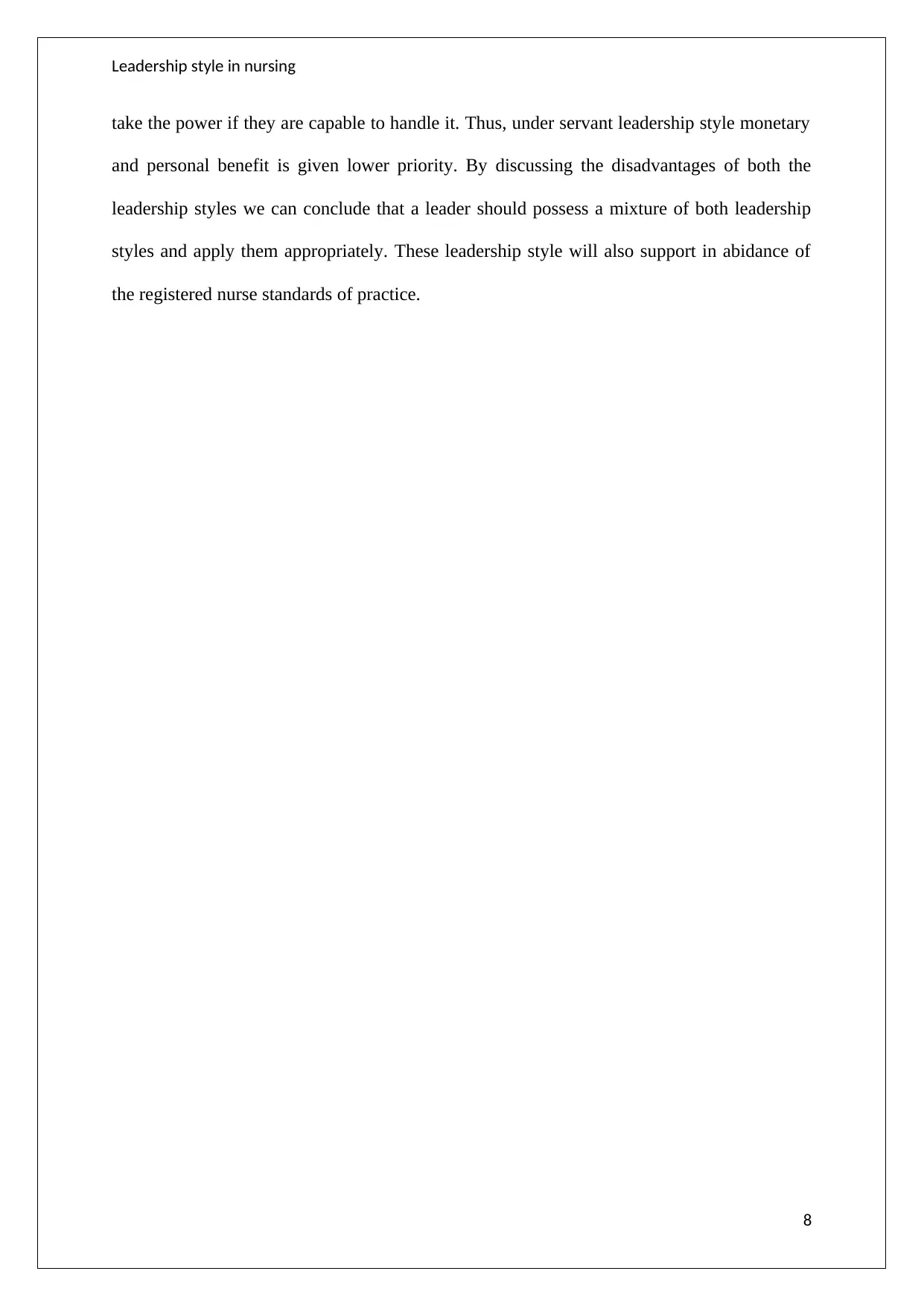
Leadership style in nursing
take the power if they are capable to handle it. Thus, under servant leadership style monetary
and personal benefit is given lower priority. By discussing the disadvantages of both the
leadership styles we can conclude that a leader should possess a mixture of both leadership
styles and apply them appropriately. These leadership style will also support in abidance of
the registered nurse standards of practice.
8
take the power if they are capable to handle it. Thus, under servant leadership style monetary
and personal benefit is given lower priority. By discussing the disadvantages of both the
leadership styles we can conclude that a leader should possess a mixture of both leadership
styles and apply them appropriately. These leadership style will also support in abidance of
the registered nurse standards of practice.
8
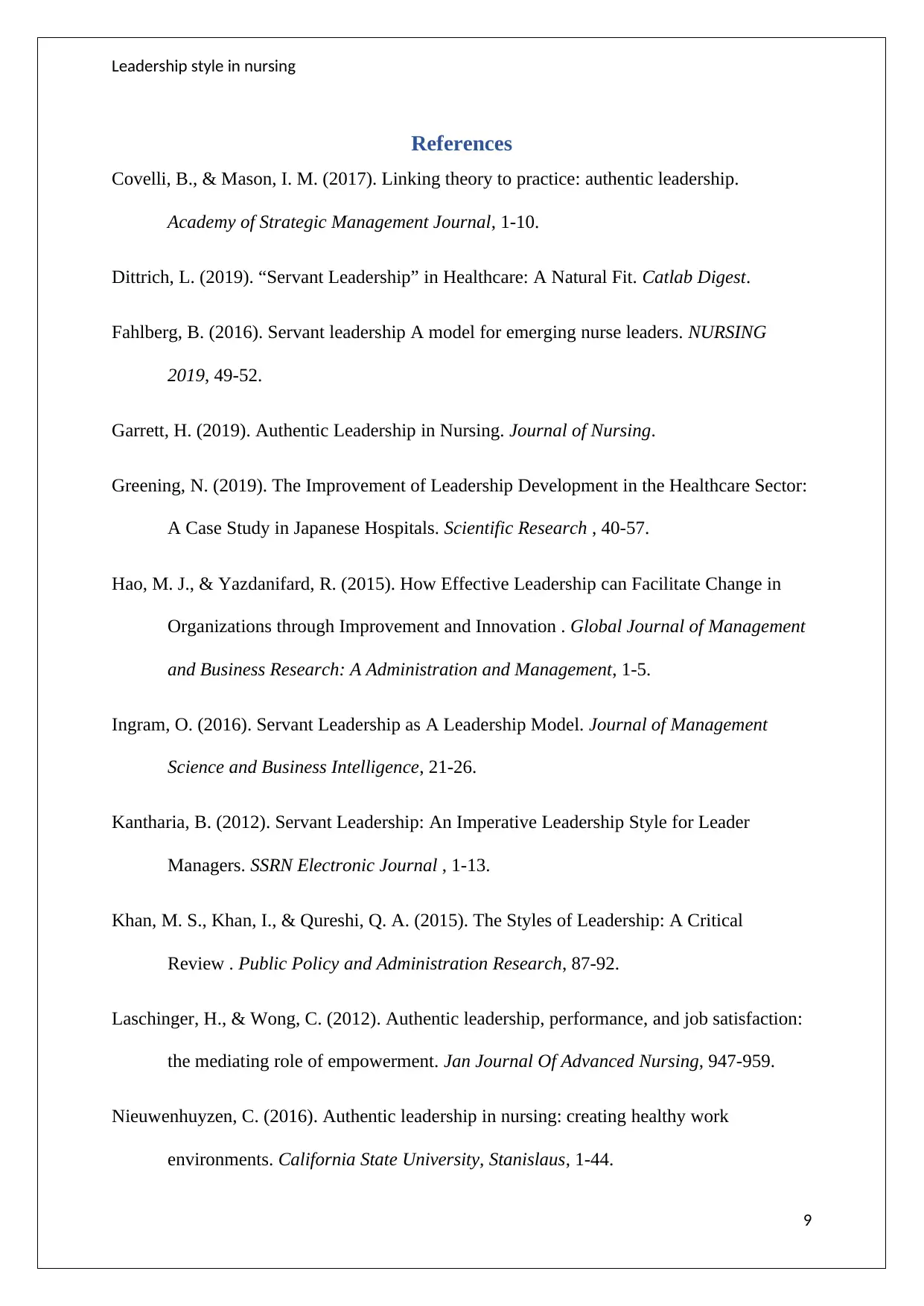
Leadership style in nursing
References
Covelli, B., & Mason, I. M. (2017). Linking theory to practice: authentic leadership.
Academy of Strategic Management Journal, 1-10.
Dittrich, L. (2019). “Servant Leadership” in Healthcare: A Natural Fit. Catlab Digest.
Fahlberg, B. (2016). Servant leadership A model for emerging nurse leaders. NURSING
2019, 49-52.
Garrett, H. (2019). Authentic Leadership in Nursing. Journal of Nursing.
Greening, N. (2019). The Improvement of Leadership Development in the Healthcare Sector:
A Case Study in Japanese Hospitals. Scientific Research , 40-57.
Hao, M. J., & Yazdanifard, R. (2015). How Effective Leadership can Facilitate Change in
Organizations through Improvement and Innovation . Global Journal of Management
and Business Research: A Administration and Management, 1-5.
Ingram, O. (2016). Servant Leadership as A Leadership Model. Journal of Management
Science and Business Intelligence, 21-26.
Kantharia, B. (2012). Servant Leadership: An Imperative Leadership Style for Leader
Managers. SSRN Electronic Journal , 1-13.
Khan, M. S., Khan, I., & Qureshi, Q. A. (2015). The Styles of Leadership: A Critical
Review . Public Policy and Administration Research, 87-92.
Laschinger, H., & Wong, C. (2012). Authentic leadership, performance, and job satisfaction:
the mediating role of empowerment. Jan Journal Of Advanced Nursing, 947-959.
Nieuwenhuyzen, C. (2016). Authentic leadership in nursing: creating healthy work
environments. California State University, Stanislaus, 1-44.
9
References
Covelli, B., & Mason, I. M. (2017). Linking theory to practice: authentic leadership.
Academy of Strategic Management Journal, 1-10.
Dittrich, L. (2019). “Servant Leadership” in Healthcare: A Natural Fit. Catlab Digest.
Fahlberg, B. (2016). Servant leadership A model for emerging nurse leaders. NURSING
2019, 49-52.
Garrett, H. (2019). Authentic Leadership in Nursing. Journal of Nursing.
Greening, N. (2019). The Improvement of Leadership Development in the Healthcare Sector:
A Case Study in Japanese Hospitals. Scientific Research , 40-57.
Hao, M. J., & Yazdanifard, R. (2015). How Effective Leadership can Facilitate Change in
Organizations through Improvement and Innovation . Global Journal of Management
and Business Research: A Administration and Management, 1-5.
Ingram, O. (2016). Servant Leadership as A Leadership Model. Journal of Management
Science and Business Intelligence, 21-26.
Kantharia, B. (2012). Servant Leadership: An Imperative Leadership Style for Leader
Managers. SSRN Electronic Journal , 1-13.
Khan, M. S., Khan, I., & Qureshi, Q. A. (2015). The Styles of Leadership: A Critical
Review . Public Policy and Administration Research, 87-92.
Laschinger, H., & Wong, C. (2012). Authentic leadership, performance, and job satisfaction:
the mediating role of empowerment. Jan Journal Of Advanced Nursing, 947-959.
Nieuwenhuyzen, C. (2016). Authentic leadership in nursing: creating healthy work
environments. California State University, Stanislaus, 1-44.
9
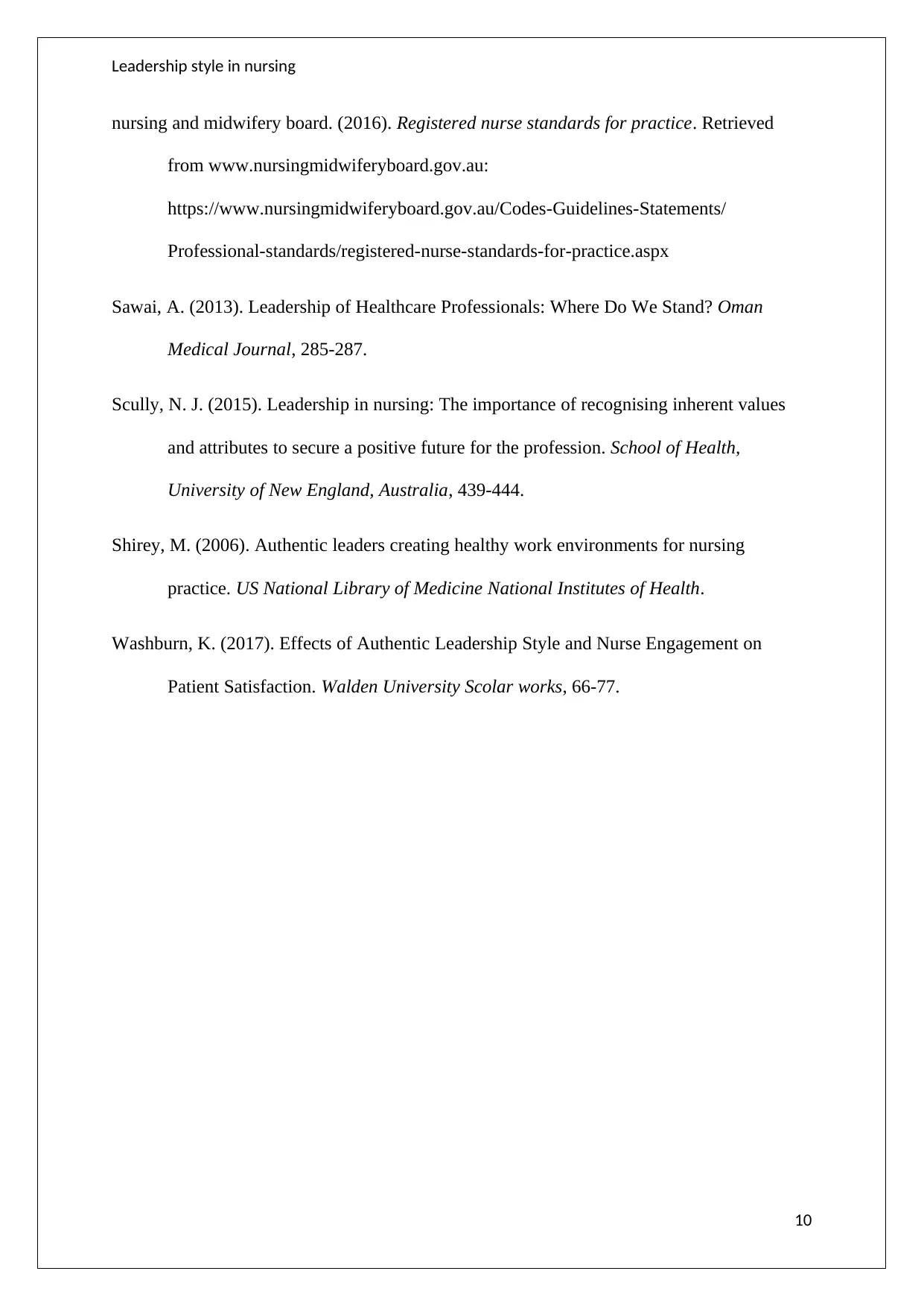
Leadership style in nursing
nursing and midwifery board. (2016). Registered nurse standards for practice. Retrieved
from www.nursingmidwiferyboard.gov.au:
https://www.nursingmidwiferyboard.gov.au/Codes-Guidelines-Statements/
Professional-standards/registered-nurse-standards-for-practice.aspx
Sawai, A. (2013). Leadership of Healthcare Professionals: Where Do We Stand? Oman
Medical Journal, 285-287.
Scully, N. J. (2015). Leadership in nursing: The importance of recognising inherent values
and attributes to secure a positive future for the profession. School of Health,
University of New England, Australia, 439-444.
Shirey, M. (2006). Authentic leaders creating healthy work environments for nursing
practice. US National Library of Medicine National Institutes of Health.
Washburn, K. (2017). Effects of Authentic Leadership Style and Nurse Engagement on
Patient Satisfaction. Walden University Scolar works, 66-77.
10
nursing and midwifery board. (2016). Registered nurse standards for practice. Retrieved
from www.nursingmidwiferyboard.gov.au:
https://www.nursingmidwiferyboard.gov.au/Codes-Guidelines-Statements/
Professional-standards/registered-nurse-standards-for-practice.aspx
Sawai, A. (2013). Leadership of Healthcare Professionals: Where Do We Stand? Oman
Medical Journal, 285-287.
Scully, N. J. (2015). Leadership in nursing: The importance of recognising inherent values
and attributes to secure a positive future for the profession. School of Health,
University of New England, Australia, 439-444.
Shirey, M. (2006). Authentic leaders creating healthy work environments for nursing
practice. US National Library of Medicine National Institutes of Health.
Washburn, K. (2017). Effects of Authentic Leadership Style and Nurse Engagement on
Patient Satisfaction. Walden University Scolar works, 66-77.
10
1 out of 10
Related Documents
Your All-in-One AI-Powered Toolkit for Academic Success.
+13062052269
info@desklib.com
Available 24*7 on WhatsApp / Email
![[object Object]](/_next/static/media/star-bottom.7253800d.svg)
Unlock your academic potential
© 2024 | Zucol Services PVT LTD | All rights reserved.





